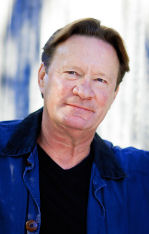






|
|
|
By Jane Davis (January, 2001)
Q: Joe Trona, the main character of SILENT JOE, was burned by his father when he was a baby and has grown up with severe scars on his face. Why did you decide to give the main character this burden?
A: It just goes back to the basic proposition that what's inside a human being is supposed to be more important than how he or she looks. We all say that, but do we live it? I've written lots of characters who look good but act rotten. So in a way I'm reversing that situation.
Q: Joe spent his early childhood in an orphanage. His scars and those years in the orphanage combined to make him very closed off from people in general. He develops some interesting tactics to deal with people and to protect himself from further harm. Can you tell us about those?
A: Joe compensates for his appearance by developing what he thinks are impeccable manners. I love the idea of a gap between the manners of a character and what's going on behind those manners. Joe thinks he owes people good manners because his face is such an ordeal to behold. I like that—a guy who thinks he's got to be nice to you because he's so damned ugly to look at. There's something almost Japanese about Joe. He feels shame. That's a lost art in this society.
Q: Joe is completely devoted to his adopted father, Will Trona, who is an Orange County politician. In Joe's eyes Will is a hero, so he overlooks Will's many mistakes and wrong doings. When Will is murdered Joe is determined to uncover who did it and why it happened—even if it means tarnishing Will's reputation in the process. Would you say this is a mystery as well as Joe's coming of age story?
A: Yes, definitely. The Germans have a name for this kind of novel—they call it a bildungsroman—which means novel of growing or novel of building. It was really refreshing for me to write about a young man. Joe's the only one of my heroes who isn't world weary in some way. He's fresh, strong and confident, like a bull first coming into the ring. There's such a glory in the young. They don't have a lot of things yet, things that only experience can bring. But they've got strength, speed, endurance, enthusiasm. You look at them and you marvel at their beauty, and you cringe when you see the pit they're about to fall into, because they fail to see it themselves. Youth is not always wasted on the young, clever as that turn of phrase is.
Q: Joe also falls in love for the first time when he meets a woman who accepts him, scars and all. How important was that for the story line?
A: I could have left Joe alone and unloved, but why? That's another thing the young have that the old don't—they love more passionately. I hadn't written a good, old fashioned, boy-meets-girl romance in a long time. When you write about men and women together, it's easy to get lost in the labyrinth of compromise and unhappiness that marks so many lives. It becomes realistic. People read it and say, yes, correct, that's how it is for me. It's easy to forget how passionate you were when you were 24 years old, what powerful joy and reckless abandon it brought to your heart. In a book like this, you're pulling for the youngsters to make love work. And they do.
Q: Once again, you have touched on corruption in local politics. Why does that subject make for such good fiction?
A: I think readers like seeing how the rich, powerful and furtive take advantage of the regular folks. It's comforting to read a novel that confirms your worst suspicions about the people and institutions around you. On a basic level, political betrayal is the worst kind of all, because you've offered people money and trust. When a leader snubs one of those gifts in order to fill his pockets with the other, that's just a dismal thing.
Q: There is a diverse population of characters and viewpoints in this book—from the wealthy developers and politicians to struggling Guatemalan immigrants and gang members. Are any of these characters based on real people? Any of these situations based on real events in Orange County?
A: You can see any and all of those characters in various parts of Orange County in a, say, two-hour span of time. They are everywhere. The situations I used for SILENT JOE are mostly made up.
Q: Joe works as a deputy guard in a prison. In the book you have written some very specific details about life in prison for the convicts as well as for the guards. How did you get this kind of detailed information?
A: I spent some time at the Orange County Jail, thanks to the generosity of Sheriff Mike Carona and his staff. I spent some hours with a young deputy whom I came to admire very much. He worked the jail, as do almost all young deputies. He showed me everything I wanted to see, plus a lot of things I had no idea about. I thought jail would be loud, in the way that a prison is loud—boom boxes, shouting, clanging doors, etc. But jail's a quiet place. The amount of order and control is extremely high. There's a constant tension between the guards and the inmates, it's really about as adversarial a situation as you can get, short of a resisted arrest or a flat-out fight. Just the physical being of the jail is fascinating. In the Orange County jail, there's an old complex and a new one. The old one looks kind of like a dungeon. The new one has got a modular design, TV monitors everywhere, a raised, plexi-glass guard station with a direct view into every cell. Mess hall is where shit happens when it does. It's an odd feeling to stand there and watch six unarmed guards try to keep 250 inmates—many of them convicted felons—on the task of eating their lunch or dinner. The really bad inmates, or those in danger of retribution by other inmates because they're homosexuals, or cops, or celebrities, or child-murderers—they go to their own special place, which is Mod J. The jail really is a world of its own. I think the interesting thing in SILENT JOE, is that Joe actually likes the jail, because he grew up in an institution for five years.
Q: This is your ninth novel. Is it getting harder or easier?
A: Harder to come up with the basic story. Easier to write once I have it. I will say that every book feels like something I'm doing for the first time. Exhilarating, spooky, liberating, withering. I love it.

|
 |
 |





